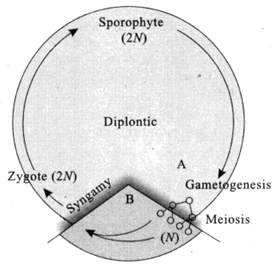Life Cycles in Plants
Life Cycles in Plants: Overview
This Topic covers sub-topics such as Diplontic Life Cycle, Haplontic Life Cycle, Haplo-diplontic Life Cycle and, Plants Life Cycle and Alternation of Generation
Important Questions on Life Cycles in Plants
Consider the following four statements. Which of the following statements are incorrect?
(A) The sporophyte in liverworts is more elaborate than in mosses.
(B) Salvinia is heterosporous.
(C) The life cycle of all seed-bearing plants are diplontic.
(D) In Pinus, male and female cones are borne on different trees.
Haplontic life cycle generally occurs in which of the following organism?
Metagenesis in Obelia is different from the alternation of generations in plants because
Haplontic life cycle is not found in which of the following.
Which of the following organisms show a haplo-diplontic life cycle?
Volvox, Fucus, Kelp, Ectocarpus, Polysiphonia, Funaria, Dryopteris, Lily, Sunflower, Cycas, Ephedra, Pinus, Eucalyptus, Selaginella, Azolla
All statements are true for the given life cycle pattern, except

**The option was changed to correctness.**
Gametes are produced in haploid plant body by
Choose the odd one w.r.t. life cycle pattern.
Sporophytic generation represented by only single cell, i.e., zygote is seen in
**Formatting of the question was changed.**
Select the miss-matched pair w.r.t. life cycle pattern:
A multicellular, filamentous alga exhibits a type of sexual life cycle in which the meiotic division occurs after the formation of zygote. The adult filament of this alga has
Zygote of an organism developed after syngamy undergoes meiosis to form haploid spores, which divide mitotically and form the gametophyte. The organism must have ___________________________________life cycle.
Zygotic meiosis is characteristic of
**Spelling error in option changed.**
Life cycle of Ectocarpus and Fucus respectively are
The most common type of life cycle in algae is
Which one of the following has a haplontic life cycle?
List some of the genera are given below :-
Saprolegnia, Chlamydomonas, Spirogyra, Polysiphonia, Laminaria, Ectocarpus, Ulothrix, Gelidium
How many above genera reproduce asexually by zoospores formation in favourable condition?
